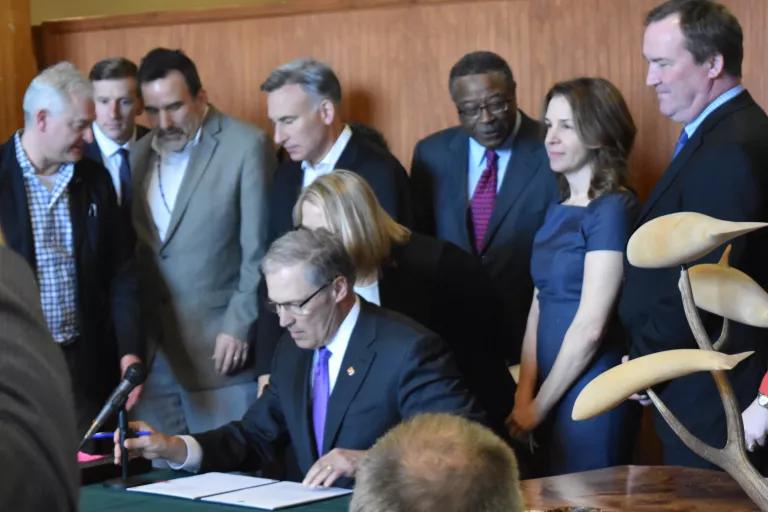
Trump’s disregard for clean water and wild species has reached Washington State. That’s not good news for the state’s endangered salmon or starving orcas. But Washington State seems ready to stand up to Trump. We can't let dirty politics make dirty rivers.
On Wednesday, Washington State announced its right under the Clean Water Act to require the federal government—which owns and operates nine dams on the Columbia and Snake rivers—to reduce oil pollution and prevent hot temperatures in the rivers. Less than 48 hours later, the Trump administration yanked the underlying draft water pollution permits in what appears to be an attempt to thwart the state's right to protect its rivers.
The strange thing is, the Trump administration had originally invited the state to weigh in. Trump’s agency sent Washington State the draft water pollution permits for the nine dams—and that triggered the state’s need to respond. But the invitation to act, apparently, was subject to federal approval of the response. The requirement to apply for National Pollution Discharge Elimination System (NPDES) permits for the dams was the result of lawsuits brought by Columbia Riverkeeper.
When Washington State signaled that it wasn’t going to let the federal dam operators continue to dump oil in its rivers and kill salmon in hot water, the federal government pulled the permits.

Without a draft permit to respond to, the state’s right to protect its rivers is in limbo. That’s bad news for the Columbia and Snake rivers' endangered salmon and the hungry orcas that depend on Columbia and Snake river salmon for their survival. But the Trump administration may have sorely underestimated Washington State’s commitment to two of its most beloved species. “Washington state has no intention of abandoning our rivers and our salmon. We have no plans to halt our current public comment period,” director of Washington State’s Department of Ecology Maia Bellon told the Seattle Times.
Bellon reportedly is “concerned that this may signal the federal government backing away from a commitment to protect the water quality of the Columbia and Snake rivers.” We cannot back away now—the Pacific Northwest’s salmon and orcas are in crisis. The Columbia and Snake rivers once formed one of the greatest salmon producing river systems on the planet. Today, the Columbia Basin is the most dammed river system in the world, and salmon return at a small fraction of their historic levels.

As the Pacific Northwest lives hotter and hotter summers, the dams exacerbate the impact because they turn cool, fast-moving rivers into slow, heat-absorbing lakes. When the rivers are too hot, salmon die. In 2015, the Columbia River got so hot that more than a quarter million sockeye salmon died before they were able to spawn. Those hot temperatures are in direct violation of Washington State’s water quality standards—standards the state would be able to enforce, if the federal government issues the water pollution permits.
The Southern Resident orcas favorite coastal place to fish is off the mouth of the Columbia River. But the whales are on the brink of extinction because they cannot find enough salmon to eat. Orca scientists point to the steep losses of the once large returns of Columbia and Snake river salmon as particularly harmful to the survival and reproduction of the orcas.

Washington State Gov. Inslee's website says that it is “difficult to imagine a Washington without orcas or salmon,” and the state has shown its readiness to dig in deep with a proposed budget that includes 1.1 billion dollars to save the two species. The state’s right under the Clean Water Act to limit river temperature is critical to recovery. Washington must continue to fight to ensure the Columbia Basin’s federal dam operators address rising water temperatures, protect salmon, and help save the Southern Resident orcas from extinction.
You can learn more about this issue here and submit comments in support of Washington State’s right to protect salmon and orcas. Just click on “Draft Permits for WA State 401 Water Quality Certification for Federal Hydropower Dams” and fill in the online form. Watchdogging the current administration can feel overwhelming—so much of what we care about is under attack. I plan to support Washington State and speak up for salmon and orcas. It is one thing we can do.

